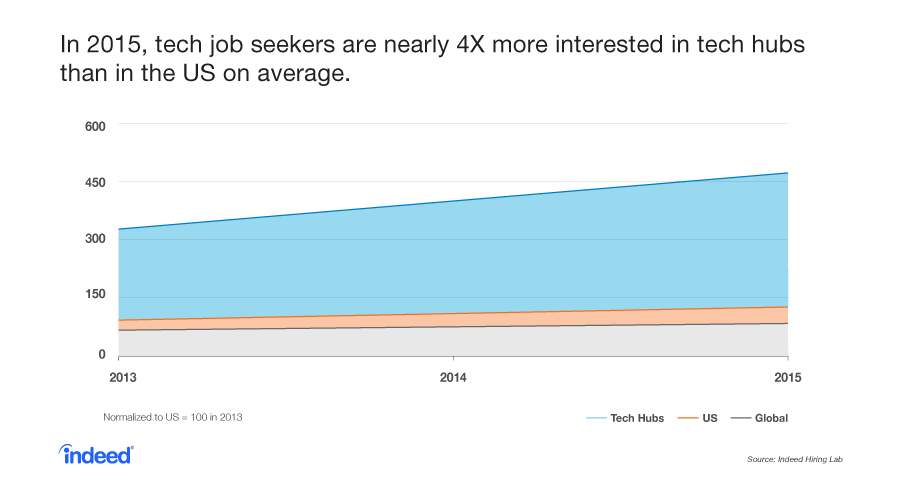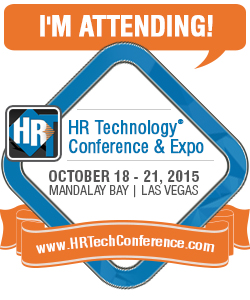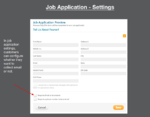Need to fill a technical job? It helps if you are in one of these four cities
Some really interesting and detailed data on jobs, job seekers, employment opportunities and the interplay among all the moving parts of the recruiting game in the recently released report from Indeed titled Beyond the Talent Shortage: How Tech Candidates Search for Jobs.
There is plenty of fascinating information in the report, but the one element I wanted to call out was the really pronounced and increasing preference by tech candidates for only four popular work locations - San Jose, San Francisco, Seattle, and Austin. According to the Indeed report, "In 2013, interest in the 18 software-related jobs we analyzed was 3.3 times greater in San Jose, San Francisco, Seattle, and Austin than in the US on average. In 2015, interest in those cities was 3.6 times greater."
The below chart from Indeed shows how these job seeker preferences for the 'Big 4' tech hubs compared to the US overall have increased over time:

So the Indeed data just puts some numbers behind what you have probably known for some time - if you are recruting technical talent and are not located in one of these Big 4 hubs, you're likely entering the competition already in a losing position. The Indeed data shows that while cities all across the US, heck, all over the world, are seeing increases in open technical jobs, that tech candidates are only honing in their efforts more on the Big 4 tech hubs.
So while in the past, and especially in times of recession, candidate interest would have been primarily driven by the availability of jobs, the increasing candidate interest in these 4 tech hubs suggests further concentration on the part of job seekers on these locales.
What can/should you be doing if indeed, (pardon the pun), you have difficult technical jobs to fill and you are not located in one of the Big 4 tech hubs? The analysis from Indeed offers a few decent suggestions:
1. Get yourself to one of the Big 4 citiies. This is the 'fish where the fish are' strategy, and of course it is easier said than done. But if these trends continue on their recent trajectory, it is only going to become more challenging to recruit tech talent to non Big 4 locations. It might be worth setting up a small, satellite office in one of these sought-after locations when compared to the opportunity cost of having important roles remain empty.
2. Let go of your 'Everyone needs to be physically at HQ' policy. Organizations have seemingly gone around and around on the value/importance of having everyone on the team physically co-located versus embracing more flexible work arrangements. And I suspect these conversations and shifts in attitude will continue to go on pretty much forever. But if the talent you need has decided they (mostly) would rather be in Seattle or San Jose and you are in Pennsyltucky then you might have to make some kind of a compromise.
3. Figure out how to better 'sell' what your location does have to offer to candidates that generally prefer the big Tech hubs. A while back I wrote a post about 'selling' your non-glamourous city to candidates, and the things i touched upon then I think are more or less still true now. The Big 4 cities may have a lot to offer candidates, but (hopefully) your city does too. And it might also be time to take a cue from politics once in a while and go negative - those Big 4 tech hubs are not all wonderful, and your city might have the edge in things like cost of living, open space, even the presence of 'winter', which I am told some people enjoy.
There is plenty more interesting information in the Indeed report - take some time to look it over if you are at all interested on what their data shows and suggests about the market for technical talent.
Have a great weekend!

 Steve
Steve


